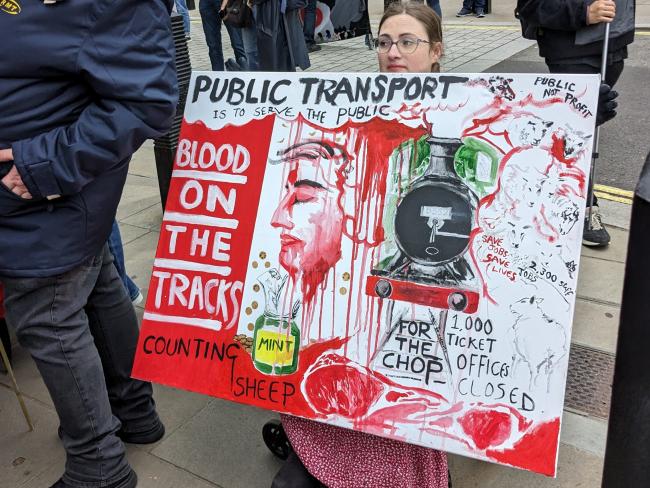1 September 2023

Passengers as well as rail workers joined the rally on 31 August. This wheelchair user had a clear message for the government. Photo Workers.
Rail workers are stepping up the fight to save ticket offices. The sham consultation on the closure of offices across our rail network ended on the last day of August.
That day RMT organised a lively march from the Department of Transport to 10 Downing Street. The rally after the march heard that the inadequate consultation period was in breach of the Equality Act 2010. As was the failure to supply consultation documents in paper format or in braille.
Restriction
This is consistent with the approach to the consultation by the government. It seems to have been designed to restrict participation by those most likely to suffer from the changes. Yet over half a million people did so, an unprecedented number.
The closures are a direct government attack on the railway, passengers, and railway staff. The speakers – a mix of trade unionists, passenger groups and MPs – all pointed out that this “reform” was initiated by the Department of Transport and not by the train operating companies, even though they carried out the consultation.
‘The use of statistics obscures the true impact of closures.’
Throughout the consultation we have been assured that only 12 per cent of passengers purchase their tickets in ticket offices. But this use of supposedly objective statistics obscures the true impact of the closures.
The12 per cent of passengers using ticket offices represent well over a million journeys. These are made by people who might not have access to the internet at home or a smartphone.
The MP for Slough reported that one third of the passengers using Slough station still purchase their ticket at the ticket office. And ticket office staff also give advice to individual travellers that a website or app cannot provide.
Forcing
Forcing people to use technology to buy a ticket is not the only problem. Several IT-aware young people reported at the rally that tickets bought using an app can cost up to £6 more for a journey than from a ticket office.
The complexity of the rail ticketing system means that many of us are already paying online more than we need to. These changes will mean many more will do so.
Exclusion
The more profound impact of these proposed changes is that they will exclude or discourage many people from travelling by train at all. For some it will be hard to get a ticket, for those with disability it will be the increased difficulty of getting on and off the train, and for others it will be feeling unsafe in unstaffed stations.
Regardless of personal circumstance, there was an overwhelming feeling at the rally that this is an attack on us all. We all want to speak to staff at stations, to another human being, and we want service when we travel.
Contrast
Speakers and participants couldn’t help but make the contrast that they were standing outside the official residence of a prime minster who recently travelled from London to Southampton by helicopter at our expense, such is his need for a personal service.
• Follow RMT on social media and their website to keep up with the next steps in this fight.
